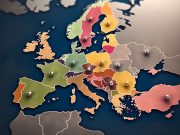Have you ever dreamed of exploring Europe? Of hopping from country to country, taking in the sights and embracing a new culture with each passing day? If so, now is your chance! Touring Europe can be an incredibly rewarding experience. But how do you make sure that your trip goes smoothly and you get the most out of it? Read on to find out what we think is the best way to tour Europe.
Traveling through Europe can open up a whole world of opportunities; whether you’re looking for unforgettable experiences or simply want to relax and explore at your own pace. There’s something magical about setting off into unknown lands, discovering hidden gems along the way, and creating memories that will last a lifetime. With careful planning and some insider knowledge, anyone can embark on an incredible journey across this continent.
Pick The Right Mode Of Transportation
When it comes to touring Europe, travelers should remember the wise words of a seasoned backpacker: “Pack light and plan ahead.” Using that mantra as a guide, those looking to explore this beautiful continent will be able to make the most out of their trip without breaking their budget or overpacking.
Touring Europe can be an overwhelming experience for first-time visitors because there is just so much ground to cover! But with some research and strategic planning, you can avoid costly mistakes like booking flights at the wrong time or missing out on must-see attractions. The key is to take your time when researching what mode of transportation would best suit your needs.
From air travel to train rides, each option has its own pros and cons depending on where you are going and how long you plan on staying – but one thing’s for certain: by taking advantage of cost-effective options such as budget airlines or public transport, adventurers can easily save money while still getting around quickly and efficiently. With these tips in mind, travelers can start organizing their journey through Europe with confidence!
Research The Must-See Attractions
Europe is a traveler’s paradise with an abundance of must-see attractions. From the Eiffel Tower in Paris to Big Ben in London, there are plenty of iconic landmarks to check off your bucket list. To make sure you don’t miss any destination gems, it’s best to map out an itinerary before embarking on your journey. Planning ahead and researching the top attractions will ensure that no stone is left unturned during your European adventure!
Start by exploring the cobblestone streets of Rome, Italy where you can admire ancient ruins like the Colosseum or take a leisurely stroll through the Vatican City gardens. Not far away lies Florence – renowned for its art galleries and romantic ambiance. Don’t forget to visit Venice while in Italy; hop on a gondola ride down one of its many canals as part of your trip!
Venture further north into Germany and France to see some of Europe’s most impressive monuments and architectural feats. Stop by Berlin’s Brandenburg Gate and explore Paris’ Louvre Museum – both cities filled with rich history waiting to be discovered. With so much culture at every turn, it’s easy to get lost amidst the beauty that abounds throughout Europe!
So if you’re looking for an unforgettable experience abroad, put together a plan and start ticking off those must-see sightseeing spots from your list. Choose accommodation wisely for each location so that you have enough time (and energy!) left over for discovering all that this continent has to offer.
Choose Accommodation Wisely
Choosing the right accommodation is an essential part of any European journey. Picking a place to stay can be as important as selecting the destinations you visit, like picking the perfect ingredients for a delicious meal. Just like packing lightly and eating locally helps to ensure that your trip goes smoothly, so does finding suitable lodging.
When looking for accommodations abroad it’s important to keep in mind that there are many options available depending on budget or style preference. Hostels offer travelers a unique experience where they can meet new people and save money while hotel rooms provide more comfort but come with a higher price tag. Airbnb is also becoming increasingly popular in Europe allowing visitors access to exclusive local homes at reasonable prices. No matter what type of housing one chooses, it’s important to book early or risk not getting a room during peak tourist seasons.
No matter how much time and money you put into planning your vacation, it’s important to include some emergency funds just in case something unexpected happens. Having extra cash makes it easier if anything comes up along the way and will give peace of mind knowing that no matter what occurs you’re prepared!
Budget For Unexpected Costs
No matter how well you plan your European tour, unexpected costs can pop up. Knowing this ahead of time will help you to budget for them and keep things running smoothly. Managing currency is a great way to ensure that you’re not overspending on items or services unexpectedly. It also helps to have travel insurance in case anything goes wrong during the trip and you need medical attention or there are issues with lost luggage. By having both of these safety nets in place, it enables freedom from worry when touring Europe and allows travelers to focus more on the adventure at hand rather than worrying about what could go wrong. Taking the time to prepare makes all the difference and ensures an enjoyable experience while visiting some of the world’s most beloved destinations. With peace of mind comes confidence which leads to greater exploration – opening even more doors along your journey!
Prepare For Language Barriers
In the age of modern transportation, a European tour can be one of the most rewarding experiences in life. As you set out to explore Europe’s many cultures and sights, there are some key preparations that should not be overlooked – particularly when it comes to language barriers. Packing lightly is paramount; however, packing strategically will equip you with the necessary tools for success.
The first line of defense against communication issues is learning a few phrases in the local languages of your destination cities. This may seem daunting at first but with online courses like Duolingo, anyone can pick up some essential words and sentences quickly – and without breaking their budget! Aiming to learn key questions such as “Where is…?” or “How much does this cost?” can go far in navigating daily tasks. Additionally, downloading offline translation apps on your phone (such as Google Translate) before travelling proves invaluable and can help save precious time during interactions.
No matter how well prepared you are for language barriers, though, there may still be times where a translator becomes an absolute necessity. In these cases, don’t hesitate to seek out a native speaker who speaks both English and the desired language fluently – they often have insider tips about lesser-known regions and activities that would otherwise remain hidden from tourists’ eyes. With careful planning and preparation, any traveler can make their European trip an exciting adventure while keeping costs low and memories high!
Frequently Asked Questions
What Is The Best Time Of Year To Tour Europe?
Planning a trip to Europe can be exciting, but also daunting! It’s important to consider the best time of year for your journey in order to get the most out of it. Depending on where you plan to visit, cultural differences may mean different weather patterns and peak tourist times that should be taken into account when planning your adventure. Generally speaking, spring (April-May) and autumn (September-October) are great seasons to experience Europe as the temperatures remain mild and many attractions will still be open; however, if you’re looking for some sunshine then summer is likely your best bet. Keep in mind that summers months tend to bring large crowds so make sure you book ahead of time–you don’t want to miss experiencing all the unique cultures across this continent!
How Much Time Should I Plan To Spend In Each City?
When planning a European tour, time is of the essence. To ensure that you make the most out of your journey and get to experience all the culture and beauty Europe has to offer, it’s important to budget your time accordingly. Depending on what type of cultural tours you seek, one should consider spending four or five days in each city; however, if you’re looking for something more fast-paced with fewer sightseeing stops along the way, two or three days may suffice. With mindful budgeting tips and advanced research into attractions available at each destination, travelers can maximize their experiences while still enjoying an enriching adventure.
What Kind Of Food Should I Expect In Europe?
Exploring Europe’s culinary delights is an exciting and rewarding experience. From regional cuisines to local street food, you’ll find a variety of delicious options. No matter which country you visit, your taste buds will be tantalized with the flavors of each region. Whether it’s freshly caught seafood in Greece or savory sausages in Germany, there’s something for everyone. If you’re looking for adventure, try sampling some traditional dishes like paella from Spain or croissants from France! With so much flavor and culture to explore, let your appetite lead the way on your European journey.
Are There Any Safety Concerns That I Should Be Aware Of?
Exploring Europe is like stepping onto a new and exciting page of the world’s storybook. When touring this continent, safety should be at the forefront of your mind due to cultural differences, language barriers, and other potential risks. While it can be overwhelming to consider all these factors when planning your trip, taking basic precautions such as researching local customs or carrying an identification card with you can help ensure that your journey remains safe and enjoyable. With its fascinating history, expansive culture, and plethora of activities, there are plenty of opportunities in Europe for travelers seeking adventure and freedom.
What Are Some Of The Most Budget-Friendly Ways To Travel In Europe?
Are you looking for some cost-saving tips and travel hacks to explore Europe on a budget? Look no further! From low-cost flights to affordable accommodation, there are numerous ways to enjoy an amazing journey throughout the continent without breaking the bank. Consider booking your flight with budget airlines like Ryanair or EasyJet, which offer significant discounts on certain days of the week. Additionally, opt for hostels instead of hotels as they tend to be much more economical. You can also find package deals that include not only airfare but also lodging and other activities. With a few smart moves and careful planning, it is possible to experience all that Europe has to offer while still staying within your budget.
Conclusion
To conclude, touring Europe can be one of the most rewarding experiences a traveler can have. From sampling succulent cuisine to taking in breathtaking views, this continent is full of wonders worth exploring. Whether you’re planning your trip for springtime or summer, it’s important to ensure that you plan enough time in each city and budget accordingly. By doing so, you’ll make sure your European vacation is safe, enjoyable, and memorable! So start packing those bags – there’s no better way to experience all that Europe has to offer than by embarking on an unforgettable tour!




























